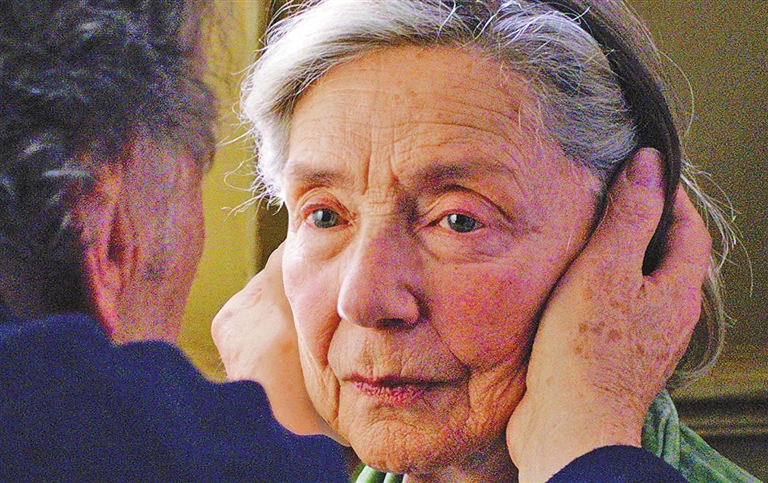
Starring: Jean-Louis Trintignant, Emmanuelle Riva, Isabelle Huppert, Alexandre Tharaud, William Shimell Director: Michael Haneke MAGNIFICENT in its simplicity and its relentless honesty about old age, illness and dying, Michael Haneke’s “Amour” is a deliberately torturous watch, one that is going to weed the master’s fan club of the lightweights who went along for the ride with the morbid mental puzzle-solving of “Hidden” and Palme d’Or winner “The White Ribbon.” No riddles to figure out here in a script that is utterly linear and unfrilly but at the same time executed with such clarity that there never is a false step or superfluous scene. Career-high performances from Jean-Louis Trintignant and Emmanuelle Riva as a genteel Parisian couple in their 80s illuminate the difficult, oft-treated subject matter, but however upscale the trappings, it’s hard to imagine this downbeat study can reach the same audiences as Haneke’s other work. Accessibility clearly is not the issue, as everything is laid out in plain sight from the bang-on opening scene: The fire brigade breaks down the door of a spacious Paris apartment to find a long-dead old woman lying in bed, her head surrounded by flowers. The rest of the film is a claustrophobic flashback leading up to this moment. Switch to a classical music concert in which only the audience is seen from the stage in a single elegant long-held shot. Among them are Anne (Riva) and Georges Laurent (Trintignant), two music aesthetes long into retirement. He hobbles a bit, but they seem to be a cheerful, alert and loving pair who treat each other with enormous civility. Coming home that night, he makes an offhand comment about how pretty she looks that expresses all the tenderness of a lifelong relationship. Then Anne has her first stroke, a mild affair mistreated with an operation (evidently at Georges’ insistence) that leaves her half-paralyzed and in a wheelchair. And so begins their terrible ordeal, whose outcome already is known. Moment by moment, the actors delicately describe Anne’s descent into physical and eventually mental debilitation, while Haneke focuses with physician-like steadiness on the test it puts on Georges’ love for his wife. When he steps out of the apartment to attend a funeral, she tries to jump out the window. She feels humiliated by her condition and hates to be seen, but she can’t refuse the agitated visits of their daughter, Eva (Isabelle Huppert, star of Haneke’s “The Piano Teacher,” another uncompromising exploration of love). Huppert negotiates a persuasive middle road, alternating hysteria and a conventional, teary reaction to Mom’s plight with a little chat about investments. All this serves as a stark contrast with her father’s measured words and behavior as he tries to keep up Anne’s spirits and preserve her personal dignity. Looking back, the two remember emotional moments from the past but not the events themselves. After Anne has a second stroke, Georges bows to the need for part-time nurses. The degenerating nature of her illness is very painful to watch, as she gradually loses the power of speech and seems to return to a state of early childhood, inarticulately crying out her pain. Trintignant and Riva are consummate veterans of French cinema but put aside their baggage of famous films from his “And God … Created Woman” to her “Hiroshima Mon Amour” to approach these roles with concentrated freshness, making each moment a deep plunge into a heroic side of themselves. In a special cameo, young classical pianist Alexandre Tharaud (who performs Schubert, Beethoven and other music in the film) appears as Anne’s brilliant pupil, who has become a world-famous recording artist. With practically all the action taking place in the Laurents’ apartment, production designer Jean-Vincent Puzos positions them in a falsely safe world of refinement filled with tapestries and bookshelves, Persian carpets and a grand piano. Darius Khondji’s rich, warm cinematography echoes the cocoon feeling of a world that time catches up with, just as a stray pigeon wanders behind locked doors from time to time. (SD-Agencies) | 
